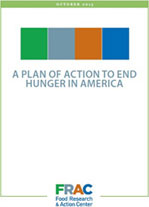Media Contact:
Jordan Baker
jbaker@frac.org
202-640-1118
Statement attributable to Luis Guardia, President, Food Research & Action Center (FRAC)
WASHINGTON, August 16, 2021 — The Food Research & Action Center (FRAC) commends the U.S. Department of Agriculture (USDA) for its reevaluation and cost adjustment of the Thrifty Food Plan, a measure used to calculate the monthly Supplemental Nutrition Assistance Program (SNAP) benefit allotment. SNAP serves as the nation’s first line of defense against hunger and this historic increase in program benefits will go a long way in ensuring tens of millions of households across the country can better afford to put nutritious food on the table.
Beginning October 1, 2021, the average SNAP benefit — excluding temporary COVID-19 boosts in place — will increase by $36.24 per person, per month, or $1.19 per day.
SNAP benefits have been crucial in mitigating food hardship and stimulating economic activity during the COVID-19 crisis. Still, research shows cost is the biggest barrier to eating healthy while on SNAP.
The reevaluation of the Thrifty Food Plan was mandated by the bipartisan 2018 Farm Bill and directed by an Executive Order signed by President Biden. We are pleased to see USDA has followed a thoughtful approach and based these adjustments on the latest available data on the four key factors identified in the 2018 Farm Bill: current food prices, what Americans typically eat, dietary guidance, and the nutrients in food items. People with lived SNAP experience also provided important input to USDA.
For more than 50 years, FRAC and its network of anti-hunger advocates have been working tirelessly to expand the reach of SNAP and increase benefit levels.
Today’s news is a tremendous step in the right direction towards a country free from hunger.
We strongly encourage the administration to continue making strides in ending hunger in America, including by making further improvements to the nutrition safety net.
###
The Food Research & Action Center improves the nutrition, health, and well-being of people struggling against poverty-related hunger in the United States through advocacy, partnerships, and by advancing bold and equitable policy solutions. To learn more, visit FRAC.org and follow us on Twitter and on Facebook.


